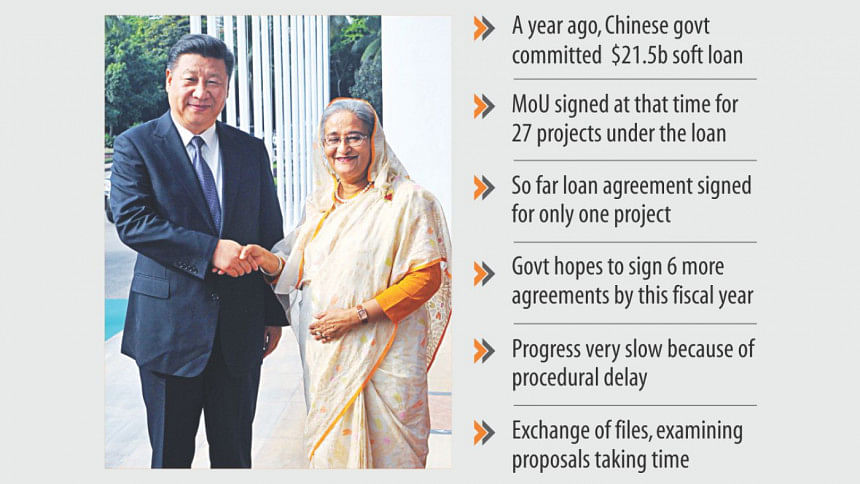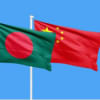Big promises, little progress

Exactly a year ago, China committed an estimated $21.5 billion in soft loan to Bangladesh for 27 projects, but Beijing is yet to release any fund mainly due to lengthy bureaucratic tangle.
The deals were signed on October 14 last year during Chinese President Xi Jinping's Dhaka visit.
Among the agreements was Karnaphuli Tunnel Loan Agreement, which was inked in the presence of the Chinese president who said he wanted “to elevate practical relations between the two countries to a higher level”.
Prime Minister Sheikh Hasina and President Jinping even inaugurated the construction work of the tunnel through a video conference from the Prime Minister's Office.
Bangladesh officials said they could not start the construction work as the Chinese Exim Bank, with which the loan deal was signed, did not release the fund. The project cost has been estimated at $700 million.
The initial agreement for the project was signed in 2014 during Hasina's visit to China. In case of projects under Chinese soft loans, signing of a loan agreement is the last step, meaning the project can start in full swing immediately afterwards.
Since January, Dhaka sent a series of letters and relevant documents to the Bank for loan activation. A government delegation also visited Beijing to expedite the release of the fund, said officials at the Bridges Division and the finance ministry.
As per the Exim Bank's demand, Dhaka sent it a manual on how the tunnel would be used, but the manual was not signed by the appropriate authorities. So the Bank requested the Bangladesh officials to send a copy of the manual with signature of the authorities concerned, which was later sent to the Bank.
A top finance ministry official said all the requirements had been fulfilled and that they were now waiting for the “letter of final loan activation”.
Both Bangladesh and China have to deal with a series of bureaucratic red tape for implementing projects under soft loans. On the Bangladesh side, the projects must have approval of several committees, which causes delay, said the official.
On the Chinese side, the process is more complex as they too must complete a number of lengthy procedures. Besides, the Exim Bank has some limitations. Only four officials of the Bank deal with foreign loans, which can cause unwanted delay, the official added, asking not to be named.
Also, Chinese firms looking to get the contract lobby hard in both the countries, causing further delay, said an official of the Economic Relations Division (ERD).
Normally, the Chinese government grants soft loans (at 2% interest; payable in 20 years, including five years of grace period) on a calendar year basis. Bangladesh initially sought funds for six projects in 2017, but the progress remain confined to paperwork.
State Minister for Finance and Planning MA Mannan acknowledged this, saying, “We did not get the funds as expected.”
But he hoped that the projects would pick up pace in future.
In case of soft loans, the Chinese government examines various aspects after the submission of the loan proposals, he added.
ERD Secretary Kazi Shofiqul Azam said they were trying to sign loan agreements for eight projects worth about $7 billion by the end of this fiscal year.
Over the last few years, Bangladesh received promises of big soft loans both from China and India. The loans from both the countries are, however, conditional.
In case of Indian soft credit, loan agreements are signed first and all other formalities, including selection of projects and their approvals, are completed later.
A month after Xi Jinping's Dhaka visit, the Prime Minister's Office (PMO), the ERD, and the line ministries prepared a roadmap in November last year for implementing the projects.
Initially, the Chinese government expressed its interest in financing three projects in telecommunication and energy sectors. But Dhaka had been pursuing for six projects, especially the 172km Padma Bridge Rail Link project worth about $3.14 billion.
The PMO even sent a special letter to the Chinese government emphasising the political and economic importance of the rail link project for Bangladesh. The letter noted that the planned rail link is also part of the BCIM (Bangladesh-China-India-Myanmar Forum for Regional Cooperation) economic corridor.
The letter further said PM Hasina wished to open the train services over the Padma the same day the bridge is opened. The government also sent a high-powered team to Beijing this year so that the deal for the project could be signed by December.
After the communication China has agreed to sign the deal this year, and the ERD last month sent all necessary papers for signing the loan agreement with Exim Bank.
The project would be implemented by 2022, but a portion of the rail line would be completed by December 2018 when the government plans to open the Padma Bridge to traffic.
Loan agreements for three projects are expected to be signed by the end of this month, ERD officials said.
The projects are Installation of Single Point Mooring with Double Pipelines ($550 million), Development of National ICT Infra-Network for Bangladesh Government Phase III ($157 million) and Modernisation of Telecommunication Network for Digital Connectivity ($231 million).
Bangladesh has also been seeking Chinese funds for two power projects -- Expansion and Strengthening of Power System under DPDC Area ($1.65 billion) and Power Grid Network Strengthening Project under PGCB ($1.32 billion).
China has agreed to finance the projects but they will give commercial loans instead of soft loans, meaning the rate of interest will be higher, finance ministry officials said.

 For all latest news, follow The Daily Star's Google News channel.
For all latest news, follow The Daily Star's Google News channel. 







Comments